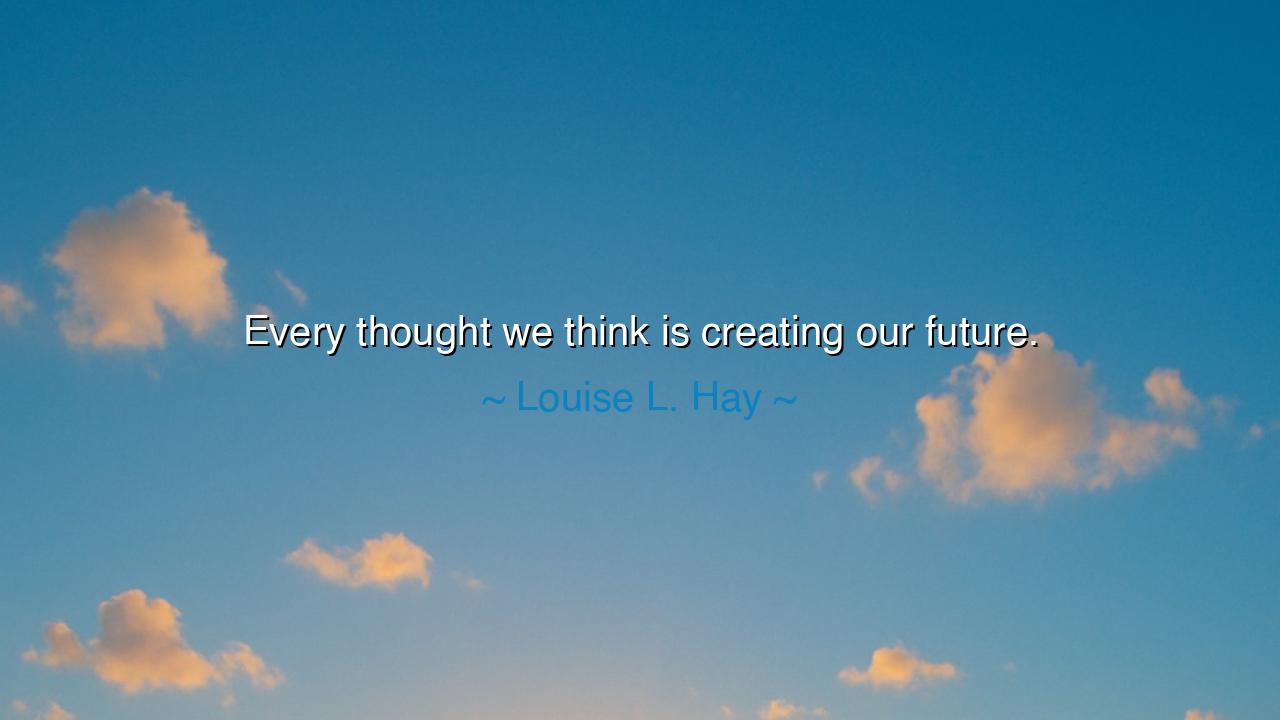
Every thought we think is creating our future.






"Every thought we think is creating our future." These profound words by Louise L. Hay speak to a timeless truth that has echoed through the ages. The idea that our thoughts shape our destiny is not a modern concept but one that ancient philosophers and sages recognized long ago. Mind and spirit have always been understood as powerful forces that can either create or destroy, depending on how they are directed. The ancient Greeks, with their rich tradition of philosophy, spoke of the power of the mind and consciousness in shaping reality. Plato himself believed that the ideal forms of existence were born from the mind’s ability to conceive of them. And so, in the same way, Hay’s quote reminds us that the thoughts we allow to dwell in our minds are the very forces that shape our future.
In the stories of old, heroes and prophets often had their destinies shaped not by external forces alone, but by the visions and thoughts that they held deep within their hearts and minds. Consider the great Achilles from Homer’s Iliad. His fate was shaped by his thoughts of glory and revenge—a powerful force that guided his every action on the battlefield. He believed that he was destined for greatness, and so his thoughts turned into reality, driving him to accomplish incredible feats. However, Achilles’ thoughts were also fueled by pride and anger, leading to a tragic end. This tale shows both the potential power and the danger of thoughts, for they can either lead to greatness or destruction.
Similarly, in the biblical stories, figures like King Solomon and Moses found their destinies shaped by their wisdom and faith. Solomon, renowned for his ability to discern and think deeply, was granted the wisdom to rule justly and wisely, creating a prosperous kingdom. His thoughts on justice and peace shaped the future of the land. But even in these stories of divine guidance, it was always the mind and the thoughts of the leaders that set the course for the kingdom. The ancient belief that our thoughts create our future is as relevant now as it ever was.
There is also the powerful story of Mahatma Gandhi, whose vision for an independent India was born not of the present reality but of the thoughts he held in his heart. He saw a future of nonviolence, unity, and peace, even when the world around him seemed consumed by conflict and division. His thoughts on truth and peaceful resistance led millions to join him in his mission, and through their collective efforts, they created a new world for India. Gandhi’s ability to focus on his vision and hold those thoughts with unwavering belief shows us the influence of the mind in shaping reality. Just as Louise L. Hay suggests, it was Gandhi’s thoughts that laid the foundation for the future he sought.
The lesson that Louise L. Hay offers us is clear: our thoughts are not just fleeting things that pass through our minds; they are the blueprints for our future. When we focus on positive, constructive thoughts, we lay the foundation for a life filled with joy, success, and fulfillment. On the other hand, when we focus on negative, self-doubting, or fearful thoughts, we may unknowingly be building walls that restrict our progress. The future, then, is not just a series of events that happen to us; it is a reflection of the mental landscapes we cultivate in our minds today.
Consider the Stoic philosophers of ancient Rome, such as Marcus Aurelius and Seneca, who believed in the importance of controlling one’s thoughts. They understood that while we cannot control external events, we can control how we respond to them. By training the mind to focus on virtue, wisdom, and calmness, we can create a future where our character and actions align with the best version of ourselves. These philosophers taught that mental discipline was not only necessary for personal peace but also for shaping a future of meaning and purpose. In much the same way, Hay’s words urge us to take responsibility for our thoughts, as they are the seeds from which our future lives grow.
So, what practical actions can we take to align ourselves with this wisdom? The first step is to become aware of the thoughts we entertain. Are they rooted in fear, self-doubt, or negativity? Or are they filled with hope, gratitude, and vision for the future? If we find ourselves dwelling on negative thoughts, we must consciously redirect our focus toward positive affirmations, growth, and progress. Like a gardener tending to the seeds of the earth, we must tend carefully to the seeds of thought that we plant in our minds. Each thought, no matter how small, is a step toward creating the future we want. And just as the ancients taught, the key to a fulfilled life is not found in waiting for circumstances to change, but in shaping the mind that shapes the world around us.
The powerful wisdom here is simple yet profound: your thoughts create your future. Cultivate the thoughts that will lead you to peace, joy, and success. Be mindful of the mental landscape you are creating, and remember that the life you live tomorrow is born from the seeds you plant today. The future is not something that happens to us; it is something we create with every thought, every decision, and every action. Take control of your thoughts today, and in doing so, you will shape the world of tomorrow.






AAdministratorAdministrator
Welcome, honored guests. Please leave a comment, we will respond soon